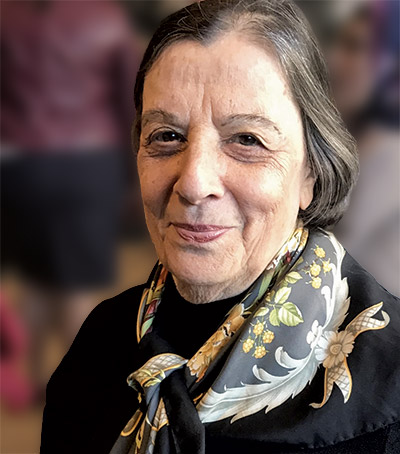Being Jewish
Personality
Blu Greenberg Is Still Advocating for That Rabbinic Will

Blu Greenberg was sitting in her dentist’s office skimming Ladies’ Home Journal in 1972 when she read that Sally Priesand had become the first woman in history to receive ordination from a rabbinical seminary. “I had such a feeling, I felt nauseous. It was so alien to me that a woman would step over the line,” recalls Greenberg, a Modern Orthodox woman who would soon after become one of the founding mothers of Jewish feminism. “I have since apologized many times to Sally and my friends in Reform Judaism.”
In 1973, Greenberg, 86, gave the keynote at the first National Jewish Women’s Conference, and 24 years after that, she founded JOFA, the Jewish Orthodox Feminist Alliance. She credits Hadassah Magazine for giving her a national platform for her ideas; her articles for the magazine served as the nucleus of her 1981 book, On Women and Judaism: A View from Tradition. A Hadassah life member, she also received Hadassah’s Henrietta Szold Award in 2006. She spoke via Zoom from her Jerusalem apartment, where she and her husband, Rabbi Irving “Yitz” Greenberg, had been living periodically since making aliyah in 2017 and continuously since the pandemic began. This interview has been edited for brevity and clarity.
WATCH NOW: CELEBRATING 50 YEARS OF FEMALE RABBIS
A virtual event featuring Rabbis Sally Priesand, Sandy Eisenberg Sasso, Amy Eilberg and Sara Hurwitz, all of whom made history by becoming the first ordained rabbis in their respective denominations.
What do you see as the most profound changes for women in Orthodox Judaism in the past 25 years?
There have been many advances, but the biggest change, affecting a small group, is women in the rabbinate. If you look at the broadest change, it’s women in Jewish learning. Through most of my years of yeshiva education, in the 1940s and 50s, I had only one significant woman teacher. Now you can find women in all these roles—learners, teachers, scholars, heads of educational institutions and rabbis.
You are known for saying, “Where there’s a rabbinic will, there’s a halachic way.” Now that halacha has enabled Orthodox female rabbis, where would you apply that aphorism today?
I want to see it applied to the agunah issue. The problem is in Jewish law and the solution should be in the law for a “chained” wife who is refused a get (Jewish divorce) by her husband. For those in a halachic community, these systemic solutions need to happen with rabbinic sanctioning. That is what will enable ending the horrible injustice that has existed for too long in Jewish history.
How has the International Beit Din helped address this issue?
The beit din was created after JOFA and New York University’s law school held a conference in 2013 looking for new solutions. If a get is not possible, the beit din can declare the marriage never to have existed at its origins, and therefore release the woman. The beit din (first headed by Rabbi Simcha Krauss, who passed away in January) still prefers a get solution, and it gives more gets than releases, but often they are “leveraged” gets, meaning that if a man knows he’s not going to receive the extortion money he is seeking, for example $250,000, and that his wife is going to obtain a release, he makes a deal for $17,000. It’s still, of course, abhorrent that a wife has to pay anything for her husband to give her a get.
What do you see as your legacy to Jewish feminism?
My legacy, beyond my family (five children, including the late JJ; 23 grandchildren and four great grandchildren) are my two books, On Women and Judaism and How to Run a Traditional Jewish Household. Also, JOFA and the many conferences I organized.
I did a lot of pioneering things over the last 45 years. I was lucky to be at the right place at the right time and I said, “Yes.”
If you were a little younger, would you be enrolled at Yeshivat Maharat, on the path to becoming a rabba?
Yes, I would. It never entered my mind when I was young. My father was a rabbi, I am married to a rabbi. I think it would have been a natural course.
READ MORE: Transforming the Rabbinate Over 50 Years
Lisa Hostein is the executive editor of Hadassah Magazine.










 Facebook
Facebook Instagram
Instagram Twitter
Twitter
Leave a Reply